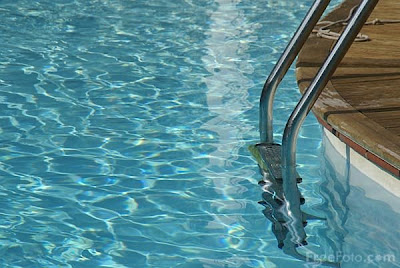
With the really warm weather we are having in Malaysia, I thought it would be a great time to immerse ourselves into an Olympic size of swimming pool. Don't you agree with me? I guess there's no better place to get away from the hotness and what’s more fun than some ice cold water on a hot day.
When we talk about swimming pools, have you ever smelled the high level of chlorine in the water? Did you ever feel itchiness on your skin with your bareback polyester sheath?
Well, I did. I smelled the strong odor and my palms always happen to appear some red patches after I swam and it's itchy. Some people are even highly allergic to chlorine, so do you know what exactly chlorine is? and why is it chlorine is added to the swimming pool.
Let's explore deeper.
According to wikipedia, Chlorine is a powerful oxidant and is used in bleaching and disinfectants. Therefore swimming pool need to be properly sanitized to ensure hygience of swimmers.Basically, it is an oxidizing agent used to disinfect water to reduce or eliminate microorganisms such as bacteria, algae and viruses.
There's few types of chlorine used for swimming pools such as
1. 56% to 62% Sodium Dichloro-S-Triazinetrione in granular chlorine
2. 90% Trichloro-S-Triazinetrione in chlorine tablets or stick
3. 65% Calcium Hypochlorite in the form of Granular Chlorine Sodium Hypochlorite in liquid form
All type of chlorine above will form hypochlorous acid which are similar to following reaction.
Cl2 + H2O → HOCl (hypochlorous acid) + HCl (hydrochloric acid)
HOCI will attack the microorganisms and bacteria in the water by destroying the lipids in the cell wall and the enzymes within the cells. HOCI causes the bacteria cells oxidized as thgey destroy the structure inside the cells. Therefore, HOCI is considered a very strong oxidizing agent.
In aqueous solution, HOCI can partially dissociate into anion hypochlorite CIO- which is weaker oxidizing agent. Hence, basic condition (high PH) will reduce the effectiveness of chlorine.
HClO ↔ OCl- + H+
Nevertheless, HOCI is unstable under high temperature. At the moment, HOCI will decompose into HCI and oxygen with the presence of sunlight. Cyanuric acid can stabilize HOCI but reduce the effectiveness of HCIO.The reaction is occurred like below.
2Cl2 + 2H2O ↔ 4HCl + O2
HOCI may combine with other chemicals to form chloroamine even with cyanuric acid as stabilising agent. Hypochlorus acid may combine with ammonia, found in urine to produce various chloroamine. Chloroamine is the main source of causing skin and eyes irritation and the unpleasant odor. Thus, the strong smell, taste and eye irritation associate with swimming pools are actually due to chloroamine but not hypochlorus acid.
NH3 + HOCl → NH2Cl + H2O
Alright, now you will think that you won't be exposed to chlorine if you promised you don't swim. I shall tell you that you are wrong. Did you ever stepped into morning shower and realized that each time you take a shower,your body is exposed to chlorine and you absorb it right into your body.
Anyhow,Scientists consider chlorine one of the most toxic elements found in nature and yet the number of people allergic to chlorine is extremely small. Eye irritation, dry skin, coughing, sneezing, stuffy or itchy nose may be just the symptoms of an intolerance to chlorine instead of a true allergy.



 8:27 PM
8:27 PM
 munnie
munnie

0 comments:
Post a Comment